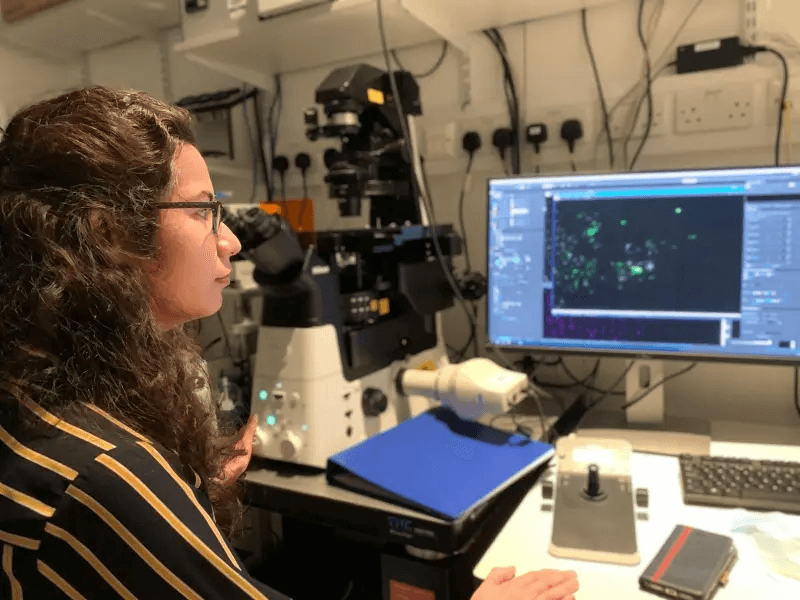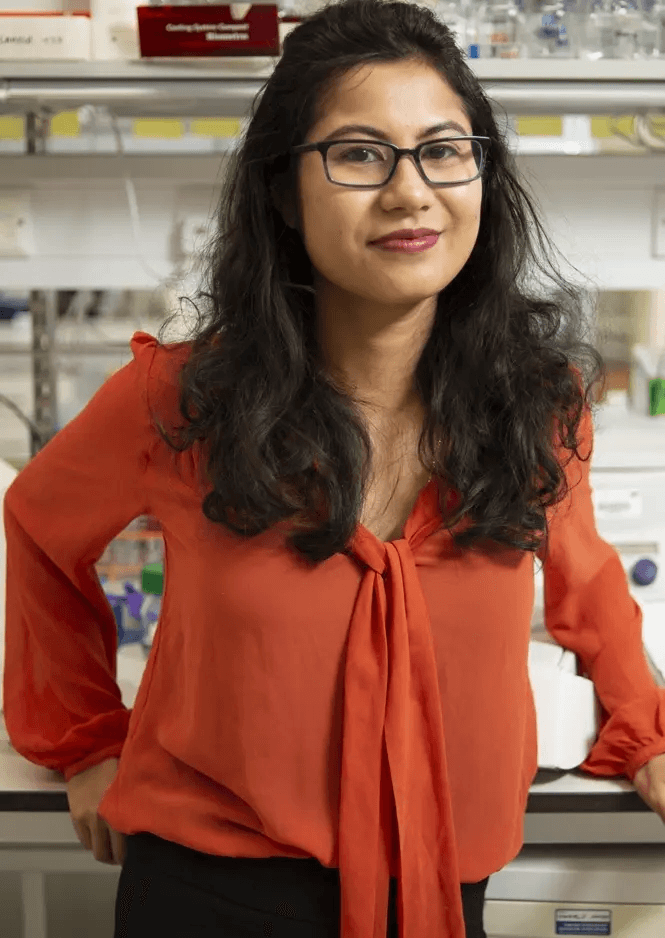
Chandrika Konwar
Mayuri Gogoi (she/her), an Indian researcher and STEM enthusiast from Assam, is pursuing her postdoctoral research at the prestigious MRC Laboratory of Molecular Biology, Cambridge. She is an immunologist trying to decipher the role of the immune response in asthma and allergy. Asthma is a chronic condition wherein the body’s immune system reacts too strongly to an allergen. This causes an inflammation of the airways in the lungs. The global burden of this disease is reaching alarming levels.
Born in Dogabheta, a small village cradled in the flood plains of Assam, Mayuri obtained her primary education in an Assamese medium village school. Her mother brought children’s books on eminent scientists to inculcate interest in science. These childhood experiences steered Mayuri towards the field of STEM.

What does a scientist look like to you?
This is a picture of Mayuri at work on a normal day. She uses microscopes and computers to conduct some of her research.
Revisiting old memories, Mayuri narrates that transition to an English medium school to pursue science in 11th grade was difficult, but things slowly fell into place. She fondly recalls the overwhelming encouragement from her peers that helped her essay her journey from Assam to Cambridge. She recounts that she was initially planning to enrol into a local college in Assam for a bachelor’s degree. But due to a dearth of courses in biological sciences, she could not. A dear friend filled Mayuri’s application for Biochemistry Honors at the University of Delhi. Once she joined Deshbandhu College for her studies, there was no looking back.
Mayuri believes that her real scientific training began during her graduate studies at the Indian Institute of Science (IISc), Bangalore. She acquired technical skills while working on typhoid, a major cause of mortality and morbidity in underdeveloped and developing countries. Her entire research mainly focused on the cross-talk between innate and adaptive immune response during Salmonella infection. Despite any prior training, she went on to publish several papers from her graduate research. Mayuri shares that publications come with a series of rejections that one must not take to heart. She advises everyone to approach their research like an outsider reading a story; this makes it easier to write research papers and eventually to get them published.
Mayuri says that she was immensely blessed to have worked under the guidance of an accomplished female mentor at a time when science is largely dominated by men. She feels indebted to her PhD mentor, Prof Dipshikha Chakravortty, who helped her realize her potential while lending her unconditional support throughout her graduate studies. Prof Chakravortty was not only empathetic to her problems. She supported her in picking up both scientific and life skills. This contributed to Mayuri progressing to a distinguished postdoctoral position at MRC, LMB.
Three valuable qualities that make a good researcher – “perseverance, resilience, and agility.” She recounts how the ability to continue despite difficulties, the strength to recover from repeated failures and the flexibility to adapt quickly enabled her through the tumultuous course of a PhD. She maintains that the most important lesson that she learnt from the entire experience was to thoroughly enjoy the process. Till date, this has been her main guiding principle as a researcher.
Mayuri stressed on the importance of a good PhD supervisor. She encourages prospective PhD students to do their due diligence in this regard while deciding on pursuing their PhD studies.

Mayuri Gogoi at LMB MRC
While talking about STEM education and research in India, she ranks the premier institutes like IISc/TIFR/IITs/IISERs at par with their global counterparts but she feels that there is still a huge lag in the opportunities and research facilities in the rest of the country. Although she is optimistic about things changing slowly, she stresses that a lot more remains to be done. Northeast India alone faces an acute problem of supply chain logistics that often comes in the way of conducting research.
People from northeast India are often subjected to discrimination due to their oriental looks and broken accent. When asked about this, Mayuri reveals that she was also discriminated against due to her ethnicity. She was the laughing stock – people made fun of her accent and often doubted her intellectual abilities, but she made sure to only let her hard work do the talking.
In addition to research, Mayuri is a proponent of STEM education and invests her spare time in running a mentoring program for the children of her village. She wants to encourage STEM education by humanizing scientific research so that she can empower these young children to make informed choices about their career. She has one clear message for all the prospective science students and researchers across India, “Love what you do.”
Acknowledgements: SciRio thanks Mayuri Gogoi, PhD for allowing us to use the images in the piece.





